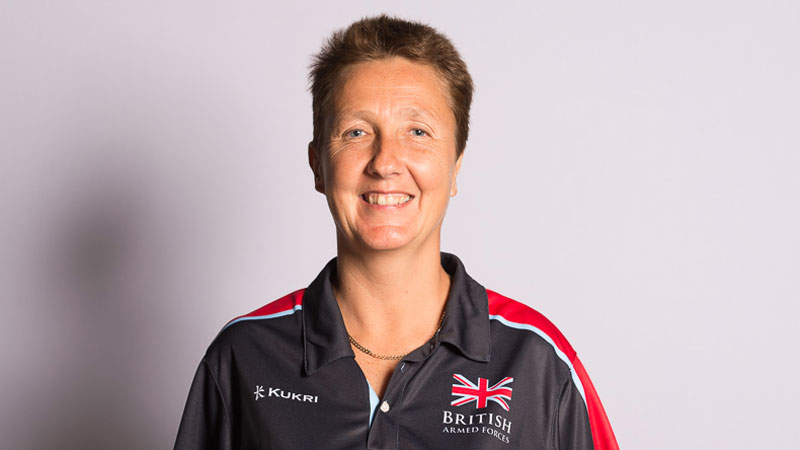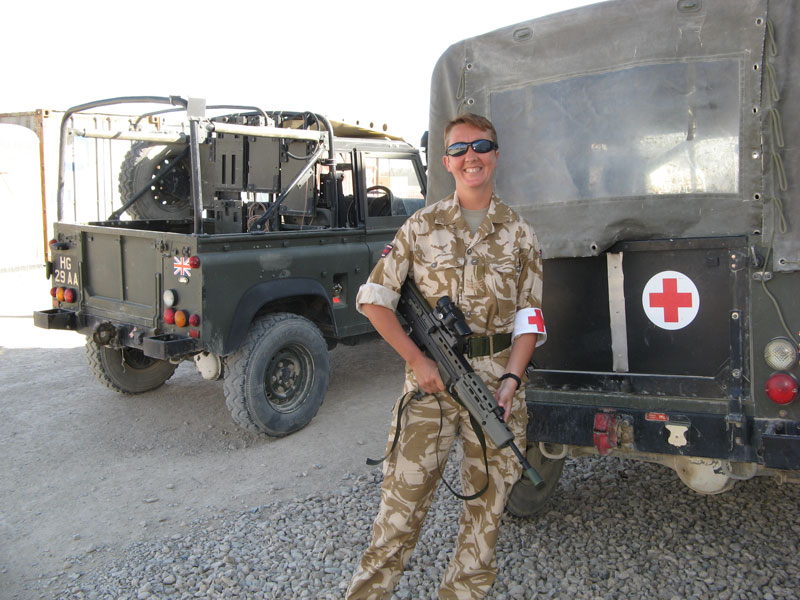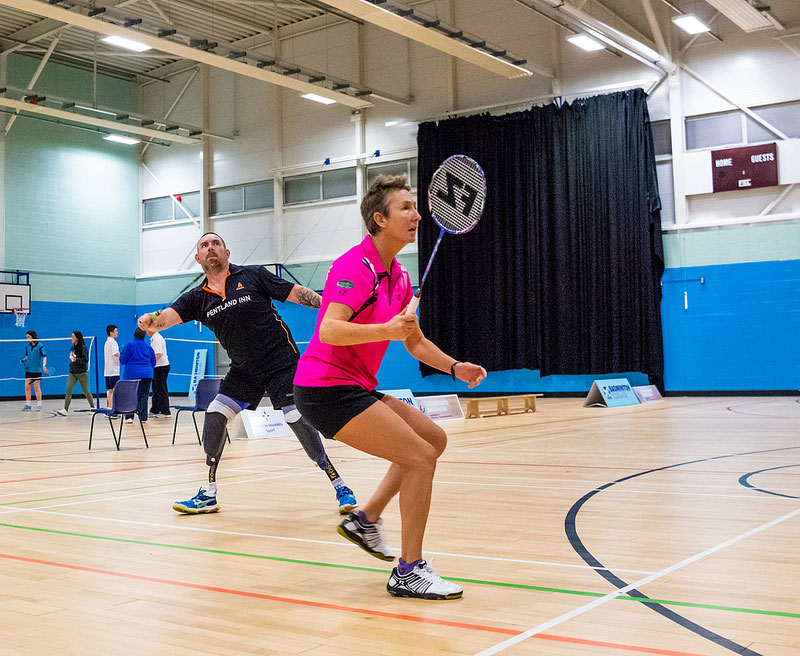Interview with Mary Wilson
‘I don’t know where my life would be without sport’

Mary Wilson, who received a QARANC Association grant to take part in elite para badminton in Japan, shares her remarkable life story of setbacks and successes
In 1986, Mary Wilson was a carefree 22-year-old, working in a bar in Glasgow, “ducking and diving” and yet to find her calling in life. Ironically it was an appendicitis that helped her find her path, and it wouldn’t be the last time that adversity would open new doors for Mary.
She explains, “I went into hospital and was put in a ward with mainly elderly ladies. My treatment for the appendicitis was fine but I looked around and saw that these ladies weren't having any time with the nurses to talk to them about things, the nurses were too busy. So that was the point at which I decided I was going to do mental health nursing.”
Mary got married and was accepted on to a nursing course in Edinburgh, but during the second year she put it on hold to accompany her husband to South Africa, where he had got a job with a gold mines contractor. Mary found work in Johannesburg with a cargo company, which she “didn't enjoy at all.”
“I loved it out there, but it was very dangerous,” Mary reminisces. “I carried a pistol with me all the time and had a German Shepherd and a rottweiler for protection. White females, when they went out in the car, were allowed to drive through red lights because there was so much hijacking and murders. I loved the warm weather, the food, and the outdoor swimming pools, but it wasn’t very safe.”
Apartheid had not yet ended, and Mary fell foul of the strict segregation rules. A delivery man came to Mary’s office, having just fled from a train where a gang had got on board with machetes and attacked the passengers. Mary said, “He was shaken-up, so I asked him to sit down and have a drink of water. One of the Afrikaner employees went past and saw a black guy sitting in my office, and I got ripped apart for that. It wasn't allowed.”
Mary returned to Scotland in 1991 and applied to the army to become a military police officer. There were no vacancies, but she was told that, if she completed her nursing qualification, the Army would take her. So, in April 1993 she was accepted as a psychiatric nurse and posted to Woolwich.
From there, Mary was sent to Hong Kong, where she suffered a nasty injury. “One night a drunk soldier got into the ward and was going to kill his wife,” reveals Mary. Unbeknown to him, she had already returned to the UK, but he managed to get through security and attacked a doctor. Mary helped to pin down the deranged man but “got a bit of a kicking” in the process.
She ended up with a ruptured stomach and her bladder stopped working. Mary underwent a “big operation” and a hysterectomy. She had to get a stoma put into her body. Thankfully, the procedure was able to be reversed and her bladder started working again. She continued with postings to Gosport and then to Belize, for seven months, where regiments were delivering jungle survival training.
“We were on call pretty much all the time,” recalls Mary. “We would go out at any time of the day or night in helicopters to either ladies who were pregnant and in labour or retrieve paratroopers who had been injured during live fire incidents.” Mary did jungle training and parachute courses – “anything I could get my hands on” – showing her capacity to push her boundaries and try new things.
During a 20-year career with the Army, Mary gave service in Bosnia, Kosovo, and Northern Ireland. She took charge of a Field Mental Health Team out in Afghanistan in 2008, which she describes as her favourite overseas posting. “It was austere, a really difficult environment and a lot of soldiers were killed, which we had to deal with. But I was able to put all my training into practice.

“We had to deal with captured Taliban who were brought into the Med Centre and because of our Geneva Convention responsibilities we had to make sure they were okay and treated with respect and dignity. At one point, we treated a Taliban fighter who had just shot one of our guys. And that was that was very hard.”
Mary used up another of her nine lives when an Afghan employee, who had slipped through the vetting process, drove a jeep at her late one night. She dived to the side of the road and thought she had escaped with nothing more than bruises. However, in the shower a few days later, Mary found a large lump on her back – it was a piece of shrapnel that had become septic. She was rushed into surgery and woke up to find a Taliban in the next bed, who “had been shot by one of our guys”. She recalls, “We just looked at each other and I thought what on earth is going on? It was just crazy.”
Mary developed multiple sclerosis and was discharged in 2012 and given a war pension. Despite feeling “pretty lucky” by the way the Army treated her, Mary felt bereft of purpose for months afterwards.
Then an email arrived from the Help for Heroes charity, advising that they were putting together a team to take part in the Warrior Games in Colorado. Mary jumped at the chance to get involved and it turned out to be a life changing experience.
“There was one guy who had stepped on an improvised explosive device (IED) losing both legs, an arm, and half his other arm – and he swam the 50 metres. We used to call him ‘Spider’ – which was part of the black humour and camaraderie – we used to take the mick out of each other, you know, to make it things better. I came back from that, and I thought para sports is what I want to do.”
Mary bought a shotput and discus and practiced in her father’s garden (that was until she accidentally smashed the flowerpots!) and this was a springboard to taking part in the Invictus Games in 2014, where she met the games’ founder Prince Harry. Mary was the captain of the field athletic team and the only female captain, which was a source of pride. She got a gold, silver, two bronzes in swimming, and two bronzes in the shotput and discus.
Where does the para badminton fit into the story? Mary had been taught the sport by her parents at age seven and played for her school. Her first big competition was the under 15 Olympic Youth championships at Aalborg, Denmark, where she won three bronze medals.
More than 30 years later she discovered there was a disability badminton club only 10 miles from her home in Edinburgh. I thought, “I might as well give it a go, I'm sure I'll be rubbish, but I really enjoyed it and within a few months was I was in Scotland team!”

Mary has taken part in dozens of national and international tournaments, which has involved spending more than £70,000 of her savings and inheritance on flights and accommodation over the years. She narrowly missed out on a space at the last Paralympics by a single point. Then, at the end of 2019, Mary was diagnosed with tongue and neck cancer and underwent chemotherapy and radiotherapy. This left her “extremely ill” during the difficult period of the pandemic.
Thankfully, Mary got the ‘all clear’ but the radiotherapy on her throat has left her with a much-limited diet. She is unable to eat meat, chicken, or fish and must eat a lot of eggs to get the protein. It’s not one of her favourite foods, but she’s discovered eggy bread with maple syrup which is more to her tastes.
Mary has written to more than 220 companies seeking sponsorship. Most don’t reply or have given polite rejections. She contacted the QARANC Association to enquire whether, as a former QA, she might qualify for a grant to take part in the Para Badminton World Championships in Japan in September 2022. Mary was “absolutely floored” when the Association responded with a grant for £3,700 towards her travel and hotel.
Mary reveals, “I managed to get into the quarterfinals in my singles. And then unfortunately, I met the now Paralympic champion. I suppose there is no shame in losing to a Paralympic champion. In the doubles I got into the quarterfinals and in the mixed doubles we didn't get anywhere, we got hammered! It was my third time in Japan. It's very nice, very clinically clean and run.
“I had the QA Association badge on my sleeve, and over the front of my t-shirt. And when people ask, ‘what is it?’ I’ve been able to spread the word about the Association.”
Mary is now training for a possible place in the 2024 Paralympics. She also plays lawn bowls for the National Scottish Para Bowls Team and is coaching badminton to disability youngsters once a week, which she admits “gives me such a buzz, and for them to have smiles and to give you a big hug makes it all worthwhile”.
Having divorced many years ago, Mary met Judy in 2002, who is now her wife, and has supported her throughout her various endeavours. Mary’s MS is progressing, but much slower than it would if she were not so active in sport, she says.
Mary has also found work as a Mental Health Specialist Mentor for Glasgow University and Edinburgh University students who are on the autistic spectrum, have attention deficit hyperactivity disorder (ADHD), or depression and anxiety, helping them to cope with through university life and their assignments.
Mary concludes, “I think when I was first diagnosed with MS, I thought of people that I nursed with the condition and they had been bedridden with catheters, and basically waiting to die. I thought, ‘I am not going to be that person,’ and something inside me clicked.
“I believe the Army had a lot to do with it. As a recruit in Basic Training, we were broken down, both physically and mentally, and then we were built up again and taught how to survive. It made me a resilient, determined, and stronger person.”
The QARANC Regiment is very close to Mary’s heart. She has made friends for life while serving and is proud to have served.
Mary Wilson was in conversation with Gazette editor Steve Bax